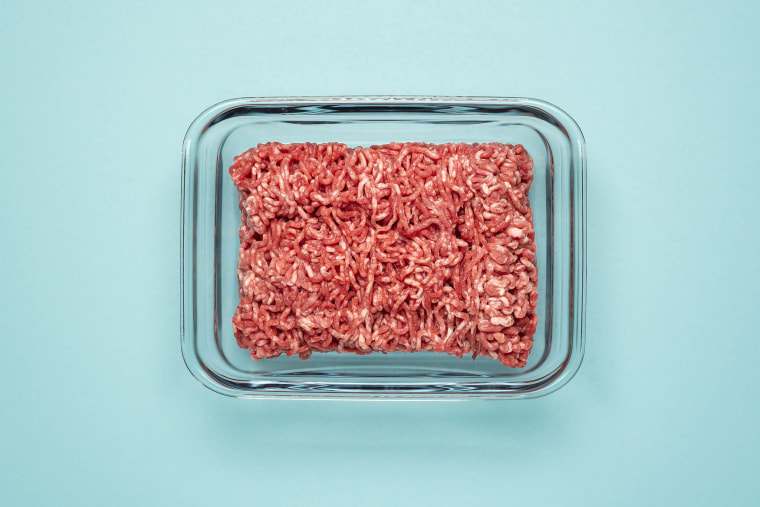Raw ground beef products sold at Walmart stores nationwide have been recalled due to possible contamination with E. coli bacteria.
There have been no confirmed cases of infection with the bacteria so far, but officials are urging consumers who purchased the recalled products to throw them out and contact their health care providers if they have illness concerns.
On May 1, the U.S. Department of Agriculture’s Food Safety and Inspection Service (FSIS) announced it was recalling over 16,000 pounds of raw ground beef products that may be contaminated with E. coli O157:H7, a deadly type of bacteria.
The raw ground beef items were manufactured by Cargill Meat Solutions, which is based in Hazleton, Pennsylvania, and shipped to Walmart retail locations across the country.
Which ground beef items are affected by the Walmart recall?
The recalled items, which include raw ground beef and burger patties sold in plastic-wrapped trays, were produced between April 26 and April 27, 2024. These include:
- 2.25-lbs. plastic-wrapped trays containing “93% LEAN 7% FAT ALL NATURAL LEAN GROUND BEEF”
- 1.33-lbs. plastic-wrapped trays containing four “PRIME RIB BEEF STEAK BURGERS PATTIES”
- 2.25-lbs. plastic-wrapped trays containing “85% LEAN 15% FAT ALL NATURAL ANGUS PREMIUM GROUND BEEF”
- 2.25-lbs. plastic-wrapped trays containing “80% LEAN 20% FAT ALL NATURAL GROUND BEEF CHUCK”
- 1.33-lbs. plastic-wrapped trays containing four “80% LEAN 20% FAT ALL NATURAL GROUND BEEF CHUCK PATTIES”
- 1.33-lbs. plastic-wrapped trays containing four “90% LEAN 10% FAT ALL NATURAL GROUND BEEF SIRLOIN PATTIES”
The recalled products all have a USDA mark of inspection on the front of the label, the establishment number “EST. 86P" on the back of the label, and a lot number of either 117 or 118, the FSIS says.
What to do if you bought recalled ground beef from Walmart
Consumers who purchased these raw ground beef products are urged not to eat them. All fresh and frozen beef products should be thrown away or returned to the store where they were purchased.
Since the recall was announced, there have been no confirmed reports of adverse reactions due to consumption of the recalled products, the FSIS says. Anyone who is concerned about illness linked to the recalled beef should contact their doctor.
What is E. coli O157:H7?
Escherichia coli (E. coli) is a bacteria that normally lives in the intestinal tract of humans and animals, according to the U.S. Centers for Disease Control and Prevention.
Many E. coli bacteria are harmless to humans, but some can cause disease. Certain types, like E. coli O157:H7, produce powerful Shiga toxins, which can make people very sick. These are called Shiga toxin-producing E. coli (STEC), per the CDC.
The most common STEC in the U.S. is E. coli O157:H7, which is transmitted to people primarily through contaminated food.
What are the symptoms of E. coli infection?
E. coli O157:H7 is a potentially deadly STEC which can cause the following symptoms:
- Stomach cramps
- Bloody diarrhea
- Vomiting
- Fever (usually less than 101 degrees Fahrenheit)
Symptoms usually begin between two to eight days after exposure to the bacteria, per the FSIS. Most people will recover within a week, but some people can develop severe dehydration or life-threatening complications.
About 5–10% of people infected with STEC can develop hemolytic uremic syndrome (HUS), a type of kidney failure. This condition can happen to anyone but it's most common in children under the age of five and older adults, according to the FSIS.
Signs of HUS include decreased frequency of urination, feeling tired, bruising easily, and losing color in the face (pallor), per the CDC. Anyone with these symptoms should seek care immediately.
The FSIS encourages any consumers with questions to contact Cargill Meat Solutions.
Fresh and frozen raw meat should always be cooked thoroughly to an internal temperature at least 160 degrees Fahrenheit, which is high enough to kill bacteria, says the FSIS.
Wash your hands, surfaces and utensils after they touch raw meat to prevent cross-contamination in while preparing food, the CDC says.
